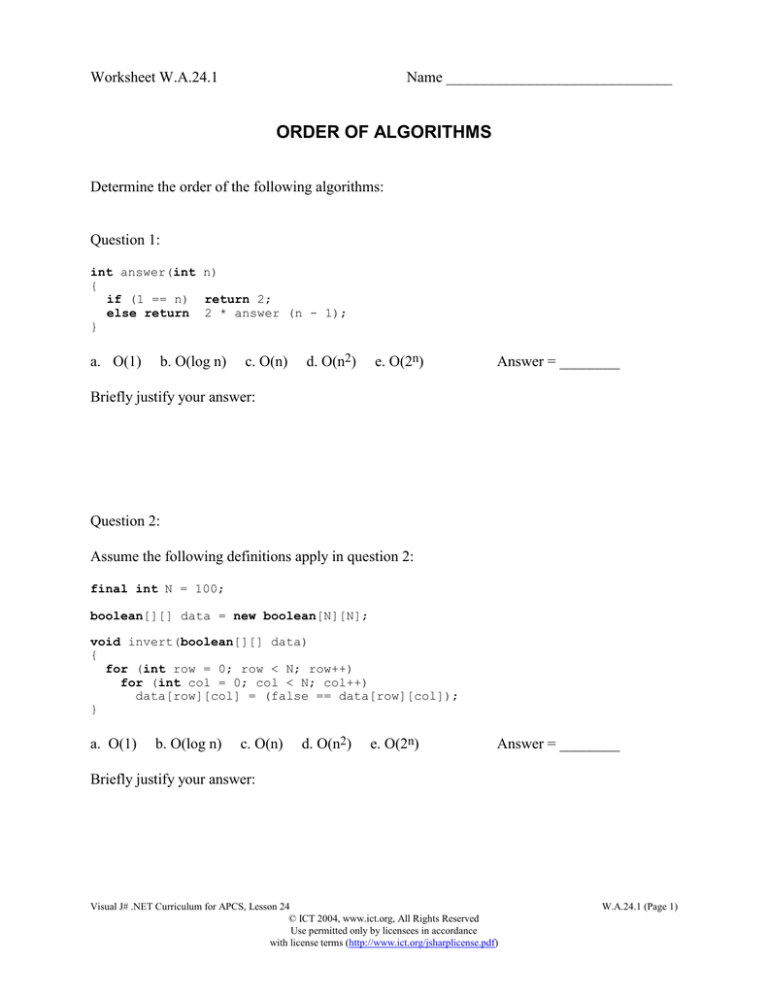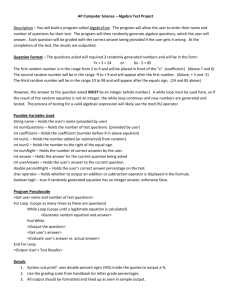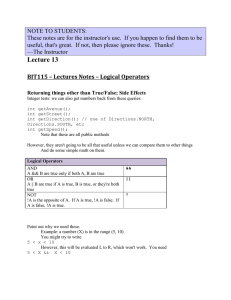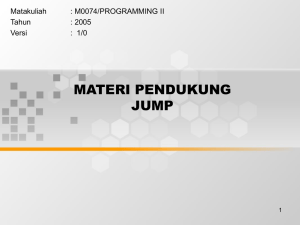
Worksheet W.A.24.1
Name ______________________________
ORDER OF ALGORITHMS
Determine the order of the following algorithms:
Question 1:
int answer(int n)
{
if (1 == n) return 2;
else return 2 * answer (n - 1);
}
a. O(1)
b. O(log n)
c. O(n)
d. O(n2)
e. O(2n)
Answer = ________
Briefly justify your answer:
Question 2:
Assume the following definitions apply in question 2:
final int N = 100;
boolean[][] data = new boolean[N][N];
void invert(boolean[][] data)
{
for (int row = 0; row < N; row++)
for (int col = 0; col < N; col++)
data[row][col] = (false == data[row][col]);
}
a. O(1)
b. O(log n)
c. O(n)
d. O(n2)
e. O(2n)
Answer = ________
Briefly justify your answer:
Visual J# .NET Curriculum for APCS, Lesson 24
© ICT 2004, www.ict.org, All Rights Reserved
Use permitted only by licensees in accordance
with license terms (http://www.ict.org/jsharplicense.pdf)
W.A.24.1 (Page 1)
Question 3:
/*
This program finds the most frequently occurring value in a list of numbers stored
in a text file, shortnum.txt. If there are multiple answers, the algorithm will
find only one of them. The integers in the file range from 1..M, and there are N
values in the file.
*/
import chn.util.*;
public class TestOrder
{
public static void main(String[] args)
{
final int M = 100;
FileInput inFile;
int largestCount = Integer.MIN_VALUE;
int count, number, mode = 0;
for (int loop = 1; loop <= M; loop++)
{
inFile = new FileInput("shortnum.txt");
count = 0;
while (inFile.hasMoreTokens())
{
number = inFile.readInt();
if (loop == number)
count++;
}
if (count > largestCount)
{
largestCount = count;
mode = loop;
}
inFile.close();
}
System.out.println("mode = " + mode);
}
}
How many times will the statement, if (loop == number) be executed?
a. N
b. M
c. N2
d. M2
e. N x M
Answer = ________
Briefly justify your answer:
Visual J# .NET Curriculum for APCS, Lesson 24
© ICT 2004, www.ict.org, All Rights Reserved
Use permitted only by licensees in accordance
with license terms (http://www.ict.org/jsharplicense.pdf)
W.A.24.1 (Page 2)
Question 4:
Assume the following definitions apply in Question 3:
final int N = 100;
int[] list = new list[N];
void reverse (int[] numbers)
{
int temp;
for (int loop = 0; loop <= (N-1)/2; loop++)
{
temp = numbers [loop];
numbers [loop] = numbers [N-loop-1];
numbers [N-loop-1] = temp;
}
}
a. O(1)
b. O(log n)
c. O(n)
d. O(n2)
e. O(2n)
Answer = ________
Briefly justify your answer:
Visual J# .NET Curriculum for APCS, Lesson 24
© ICT 2004, www.ict.org, All Rights Reserved
Use permitted only by licensees in accordance
with license terms (http://www.ict.org/jsharplicense.pdf)
W.A.24.1 (Page 3)




